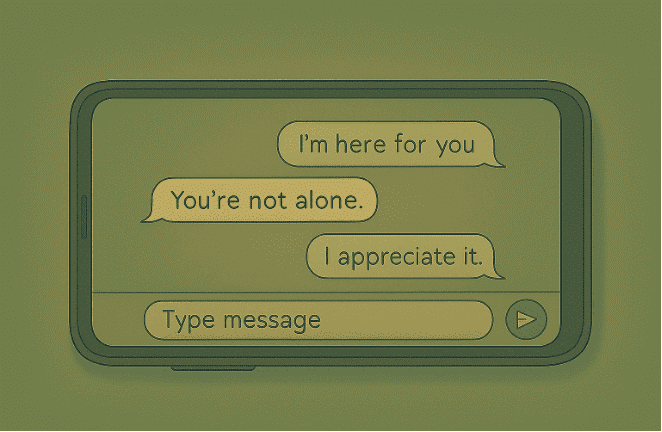Key Takeaways
- Anxiety is more than occasional nerves as it affects both mind and body, and understanding this helps you respond with empathy instead of frustration.
- What you say matters; validating your friend’s feelings can calm their nervous system and build deeper trust.
- The right words don’t need to fix anything—they simply remind your friend that they’re not alone and that their feelings are valid.
- Supporting someone with anxiety requires balance; caring for yourself ensures you can continue showing up with patience and compassion.
- Mission Prep provides specialized, teen-focused treatment combining therapy, academics, and family involvement, helping adolescents build resilience and lasting emotional well-being.
When Your Friend is Struggling: Understanding Anxiety’s Impact
Anxiety isn’t just pre-presentation nerves. For those with anxiety disorders, it can be a constant, exhausting companion that touches every part of life. Around 31% of U.S. adults experience an anxiety disorder at some point in their lives, making it the most common mental health condition in America. Your friend isn’t choosing this, their brain’s threat detection system is in overdrive.
Physical symptoms can be as distressing as the mental ones: racing heart, shortness of breath, dizziness, nausea, or chest pains. Many panic sufferers genuinely fear they’re dying, creating a feedback loop that intensifies anxiety.
Social consequences often follow. Your friend may avoid situations, decline invitations, or isolate themselves. What seems like flakiness is often an attempt to manage overwhelming feelings. Understanding this lays the foundation for meaningful support.
Mission Prep Healthcare specializes in mental health treatment for teens aged 12-17, offering residential and outpatient programs for anxiety, depression, trauma, and mood disorders. Our therapies include CBT, DBT, EMDR, and TMS, tailored to each adolescent’s needs.
With a structured, supportive environment, we integrate academic support and family involvement to promote lasting recovery. Our goal is to help teens build resilience and regain confidence in their future.
How Anxiety Feels from the Inside
Imagine constantly scanning for threats, unable to rest even in familiar settings. Thoughts race toward worst-case scenarios while the body reacts as if those fears are real. It’s exhausting, confusing, and often embarrassing.
Many feel “broken” because they can’t control these reactions. They may know their fears are disproportionate, but feel powerless to stop the physical and emotional cascade. This gap between knowledge and feeling creates further distress and shame.
Why Your Words Matter
How you respond can build bridges or walls. When someone shares their anxiety, your words shape their experience. Dismissive comments reinforce isolation (“No one understands”), while compassionate ones create safety (“I’m not alone after all”).
Research shows that validation of emotions can reduce negative feelings and improve emotional regulation, with effects varying by emotion type and individual dysregulation levels. Your calm, accepting presence sends safety signals, helping interrupt the anxiety cycle. You don’t need to “fix” it, simply creating space for understanding makes healing more possible.
The most helpful responses acknowledge reality without catastrophizing or minimizing. This balance offers honesty, hope, and perspective when it may feel out of reach.

Check-ins matter: regular, compassionate contact builds trust and emotional safety.
8 Supportive Things to Say to an Anxious Friend
Finding the right words can feel overwhelming. You want to help but worry about saying the wrong thing. These eight supportive phrases provide a starting point for validating, comforting, and empowering your friend through difficult moments. Effective responses acknowledge their experience without judgment and create connection, rather than trying to “solve” anxiety with logic alone.
1. “I’m here for you. You don’t have to face this alone.”
Anxiety often isolates people. Offering your presence without conditions creates a safe harbor. You’re not promising to fix their anxiety, just to witness their struggle and ensure they don’t face it alone, a relief that can shift panic toward possibility.
2. “What can I do to help right now?”
Anxiety manifests differently for everyone. Asking directly empowers your friend to express what they need, whether practical help or simply quiet support. Even if they can’t articulate it, the question signals genuine care and willingness to meet them where they are.
3. “Would it help if I just sat with you for a while?”
Decision-making can feel impossible during anxiety. Offering your quiet presence removes the burden of figuring out help. Research shows that co-regulation, one calm nervous system influencing another, can reduce physiological distress, creating a safe, judgment-free space.
4. “Your feelings are valid, even if they don’t make sense to you.”
Many people berate themselves for anxious thoughts. Validating emotions without requiring logic interrupts this self-criticism, giving permission to feel without the burden of justification, which helps intensity naturally diminish.
5. “This is temporary. You’ve gotten through tough moments before.”
Anxiety can feel endless. Reminding your friend of past resilience, specific examples when possible, offers hope and perspective, making the reassurance more believable when everything feels hopeless.
6. “Do you want to do something to take your mind off things?”
Distraction can interrupt rumination. Offering a gentle activity, walk, a movie, or a game, provides temporary relief. Light movement, in particular, reduces stress hormones and makes anxiety more manageable, even if only briefly.
7. “Have you eaten/slept/had water recently?”
Anxiety often interferes with basic needs, which in turn worsens distress. Gently checking in, framed as a shared experience rather than nagging, can uncover simple interventions, like food, hydration, or rest, that provide immediate relief.
8. “I’m proud of you for how you’re handling this.”
Living with anxiety requires courage. Acknowledging their efforts, using coping strategies, seeking help, or simply functioning despite distress, validates their struggle and counters negative self-talk with recognition of resilience.
What Not to Say to Someone with Anxiety
Even with good intentions, some responses can worsen anxiety and damage trust. Common mistakes include dismissing their experience, offering simplistic solutions, or implying they should control anxiety through willpower. Anxiety is a real health condition, not a character flaw.
Avoid Dismissive Comments Like “Just Relax” or “Stop Worrying”
If they could simply relax, they would. Phrases like “calm down” or “you’re overreacting” invalidate feelings and add shame. A better approach: “I can see you’re struggling. What would help you feel more grounded?” Anxiety involves real physiological responses—compassion is needed, not dismissal.
What They Hear
- “Your feelings are invalid.”
- “You’re choosing to feel this way.”
- “I don’t understand what you’re experiencing.”
Don’t Minimize Their Experience with “Everyone Gets Stressed”
Everyday stress is not the same as an anxiety disorder. Minimizing comments can leave your friend feeling isolated. True support acknowledges the intensity of what they’re experiencing.
Skip Problem-Solving Without Listening First
Jumping straight to advice, “Have you tried meditation?”, bypasses emotional validation. Listen fully, validate their feelings, and only offer suggestions if they want them.
How to Support During Different Types of Anxiety
Anxiety shows up in many forms, each needing different support strategies. While validation and presence remain key, your approach may vary depending on if your friend faces panic attacks, social anxiety, or persistent worry. Recognizing the type of anxiety helps you respond effectively and provide meaningful help.
Helping During Panic Attacks
Panic attacks demand immediate support. Symptoms, racing heart, difficulty breathing, dizziness, tingling, can feel life-threatening. Stay calm, speak in a steady voice, and reassure them it’s a panic attack, not a medical emergency. Guide slow, deep breaths, perhaps by breathing along with them.
Grounding techniques, like the 5-4-3-2-1 method, help redirect attention outward: name five things you see, four you can touch, three you can hear, two you can smell, one you can taste. Remind them that panic attacks end, usually within 20–30 minutes, even if they feel endless.
Supporting Through Social Anxiety
Social anxiety involves fear of judgment in social settings. Your friend may avoid gatherings or struggle to speak. Be their “safe person,” check in regularly, and plan exit strategies in advance. Start with smaller events and celebrate small successes. Avoid highlighting their anxiety in group settings, which can worsen self-consciousness. Gentle encouragement helps prevent isolation without pushing beyond their comfort.
Being There for General Worry and Overthinking
Persistent worry requires ongoing validation rather than immediate intervention. Listen without rushing to reassure or solve problems. Encourage perspective by asking questions like, “What evidence supports this?” or “What would you tell a friend?” Help distinguish productive problem-solving from endless rumination.
Simple distractions, games, puzzles, cooking, or light exercise can interrupt overthinking and provide temporary relief. Sometimes, a short worry break is enough for your friend to gain perspective and calm their mind.
Creating a Safe Space for Honest Conversations

Listening first and offering solutions later respects your friend’s needs and pace.
The most valuable gift you can offer an anxious friend is a judgment-free zone where they can express fears without criticism or rushed reassurance. Many hide their struggles, ashamed of irrational thoughts or afraid of burdening others. Consistent acceptance encourages honesty.
Active listening is key: maintain eye contact, remove distractions, and resist formulating responses while they speak. Ask open-ended questions and validate feelings before problem-solving: “That sounds really hard. I appreciate you trusting me with this.”
Creating safety is ongoing. Each validating interaction builds trust, making it more likely your friend will reach out before anxiety escalates, especially when discussing professional help.
Setting Boundaries That Work for Both of You
Supporting a friend is meaningful but shouldn’t harm your wellbeing. Healthy boundaries prevent burnout and strengthen your ability to show up consistently. Be clear about availability: “I’m usually available weekday evenings and want to be there during tough moments.”
Encourage other resources if support is needed when you can’t provide it. You’re not responsible for “fixing” their anxiety. Your role is validation and connection, not therapy.
Balancing Support with Self-Care
Supporting someone long-term can be emotionally taxing. Self-care isn’t selfish—it sustains your ability to help. Watch for compassion fatigue: irritability, numbness, or dread.
Regular rituals, exercise, nature, creative pursuits, or connecting with your support system replenish energy. Transparency about self-care models, healthy boundaries, and ensuring you remain present and effective for your friend.
When Professional Help Might Be Needed
Friendship provides vital support, but some anxiety requires professional care. Therapists offer specialized training, tools, and evidence-based strategies beyond what a friend can provide. Encouraging professional help is a sign of care, not abandonment.
Signs Your Friend May Need More Support
Seek professional help if anxiety disrupts daily life, work, or relationships, or if avoidance, worsening symptoms, or risky behaviors, like substance use or self-harm, appear. Persistent physical symptoms, such as panic attacks, sleep issues, or appetite changes, also indicate it’s time to reach out.
How to Suggest Professional Resources
Choose a calm moment and frame therapy as a complement to your support. Use gentle, personal language: “I’ve noticed your anxiety affects your sleep and work. Talking to someone trained might help.”
Offer practical help: research therapists together, accompany them to an appointment, or help them prepare what to say. Consider sliding-scale or community options if cost is a concern. Emphasize that seeking therapy is a sign of strength, not weakness.
Supporting Teens with Professional Care: Mission Prep
For adolescents struggling with anxiety, depression, trauma, or mood disorders, Mission Prep provides specialized residential, outpatient, and telehealth programs exclusively for teens aged 12–17. Our licensed, home-like environments prioritize safety, structure, and a sense of belonging, helping teens feel secure while receiving care.

Mission Prep’s collaborative approach gives teens a voice in their treatment, building agency and resilience.
Key Features of Mission Prep Programs:
- Teen-Focused Care: All services are designed specifically for adolescents, ensuring therapeutic, social, and academic elements are age-appropriate.
- Comprehensive Levels of Care: Residential, outpatient, and virtual programs support teens at every stage of recovery.
- Evidence-Based Therapies: Treatment includes CBT, DBT, EMDR, and TMS, specifically designed to engage and support adolescents effectively.
- Family-Centered Approach: Families are actively involved through weekly therapy, regular communication, and structured transition planning.
- Integrated Academic Support: Teens continue educational progress while in treatment through personalized academic coordination.
- Licensed, Home-Like Settings: Semi-private rooms, shared meals, and structured routines create a safe, nurturing environment.
Mission Prep combines clinical expertise with a supportive, collaborative environment that equips teens with the tools and resilience to manage mental health challenges long-term. Families are guided throughout the process, ensuring sustainable growth and a smoother transition back home.
Frequently Asked Questions (FAQs)
How do I know if my friend’s anxiety is serious enough to warrant professional help?
If anxiety disrupts daily life, work, or relationships, or causes avoidance, worsening symptoms, or dangerous behaviors, professional support is needed. Persistent physical symptoms or instinctual concern that friendship alone isn’t enough also signal it’s time to seek help.
What should I do if my friend is having a panic attack?
Stay calm, speak steadily, and reassure them that panic attacks aren’t dangerous. Guide slow breathing and use grounding techniques. Validate their experience: “I know this feels awful. I’m here, and we’ll get through this together.” Avoid saying “relax.”
Can I help my friend with anxiety if I have anxiety too?
Yes, shared experience fosters empathy and understanding, helping you recognize subtle signs. Maintain boundaries, communicate your limits, and support each other. Sharing coping strategies or treatment experiences offers hope, while respecting that approaches vary between individuals.
How often should I check in with a friend who has anxiety?
Check in with consistent care but avoid pressure. Frequency depends on their needs, daily brief messages or weekly deeper conversations. Prioritize quality and responsiveness, observing whether check-ins provide comfort or feel burdensome.
How can parents stay involved during treatment?
Family involvement is key to long-term success. Mission Prep includes weekly family therapy, progress updates, and support for parents, helping families heal and grow together while maintaining healthy communication.





















